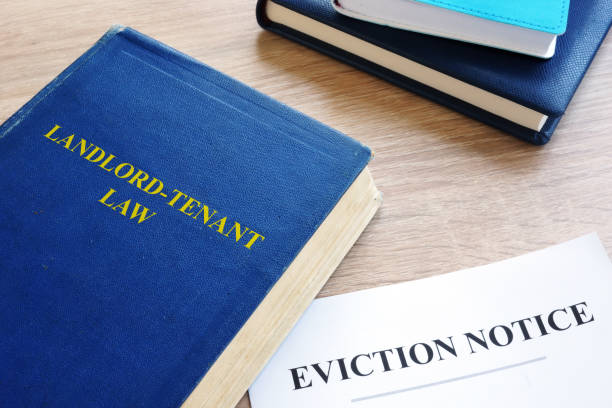
A Comprehensive Guide to Kansas Roommate Eviction Laws
Evictions become a little more complicated when roommates are involved. It’s important for a landlord and tenant in Kansas to familiarize themselves with the precise eviction laws regarding this category. It touches on the eviction laws that have a bearing on roommates in Kansas, with an aim of offering valuable insights and legal parameters dictating the status quo.
Understanding the Basics of Eviction Laws in Kansas
Eviction refers to a legal process through which a landlord may regain possession of a rental unit from a tenant. This typically occurs due to a violation of some terms in the rental agreement or non-payment of rent. The eviction laws of Kansas are outlined in specific statutes and require landlords to follow a strict legal process. This includes issuing proper notice to tenants and, if necessary, filing an eviction lawsuit in court.
Notice Requirements
A landlord must give the tenant written notice before deciding to file an eviction suit. The notice should state the reason for eviction and the time in which the tenant should take action to correct the situation or vacate the rental unit. The type of notice required depends on the reason for the eviction:
- Non-Payment of Rent: If the eviction is due to non-payment of rent, the landlord must issue a “Notice to Quit for Nonpayment of Rent.” This notice gives the tenant a specific number of days to rectify the overdue rent or move out of the premises. In Kansas, this notice period is typically three days.
- Violation of Rental Agreement: If there has been a violation of the rental agreement, such as property damage or illegal activity, the landlord must deliver the “Notice to Quit for Violation of Lease Terms” to the tenant. This notice informs the tenant of the specific lease violation and allows a reasonable time for the violation to be corrected or for the tenant to vacate. The notice period is usually 14 or 30 days, depending on the offense.
Landlords must ensure that the notice is properly served according to Kansas law, including the methods of delivery and timing.
Legal Proceedings
If the tenant fails to remedy the situation or vacate the premises within that period, then the landlord can start the legal process by filing an eviction case in court. In Kansas, this legal procedure is referred to as “unlawful detainer,” and it is regulated by state statutes.
- Filing the Lawsuit: The landlord begins the eviction lawsuit by filing a “Petition for Eviction” at court. The petition includes information about the tenancy agreement, the reason for eviction, and proof that the tenant was provided with the proper notice of eviction.
- Court Hearing: After the filing of the case, the court schedules a hearing where both the landlord and the tenant can make their case. The tenant has the right to answer the eviction petition and may present any defenses or counterclaims.
- Judgment: Based on the evidence presented, the court will make a judgment either for the landlord or for the tenant. If the judgment is in favor of the landlord, the court will issue a writ of possession to the landlord, by law, allowing him to take back the rented premises.
- Enforcement: If the tenant doesn’t move out of the premises following the issuance of the judgment, the landlord can request law enforcement to enforce the eviction order, removing the tenant from the property.
It is crucial for landlords in Kansas to follow all legal procedures and requirements when evicting a tenant to avoid any potential legal challenges or repercussions.
Different Types of Eviction Notices
There are quite a number of different Kansas eviction laws for roommates that will be included in the eviction notices.
Pay Rent or Quit Notices
Landlords in Kansas usually are forced to issue the Pay Rent or Quit Notices to a delinquent tenant, failure of which to pay up results in eviction. These are formal warnings about late payment of rent from the roommate and hence give him a chance to put things in order. Following is the detailed overview:
- Purpose: Pay Rent or Quit Notices are notices intended to inform the tenant of their rent default and urge them to remedy the situation without unnecessary delay.
- Time Frame: Under Kansas eviction laws, roommates are given a three-day period from the notice date to either pay the overdue rent or leave the house.
- Legal Requirement: Under the legal notice, landlords are required to serve the notice in writing, outlining the amount of rent due and the deadline for payment. This not only makes it official but also provides formality; therefore, the landlord serves the notice in writing, stipulating both the rent due and the date when it should be settled.
Cure or Quit Notices
Cure or Quit Notices are the other type of eviction notice used when a roommate is in violation of lease terms, except for non-payment of rent. Violations could be anything from unauthorized subletting to causing excessive noise disturbances. Here’s a closer look at Cure or Quit Notices.
- Purpose: The primary purpose of Cure or Quit Notices is to inform the roommate of specific lease violations and give them an opportunity to remedy the situation.
- Example of Violations: Common breaches demanding a notice to cure or quit include unauthorized subletting, keeping pets without permission, or engaging in any other nuisance that violates the terms of the lease agreement.
- Time Frame: Comparable to Pay Rent or Quit Notices, roommates typically have the time stipulated by the notice to remedy the violation or vacate the premises.
- Legal Requirement: Kansas eviction law requires landlords to specify both the nature of the breach in the notice and what actions have to be taken to remedy it. This notifies roommates that a breach has occurred and describes actions that need to be done to preclude more serious legal consequences.
Unconditional Quit Notices
In the case of a serious violation of the lease that cannot be remedied, landlords are allowed to serve Unconditional Quit Notices. These notices notify the tenant of the property to vacate at the earliest opportunity without the chance to remedy the breach. Here’s a deeper look into Unconditional Quit Notices:
- Purpose: Unconditional Quit Notices are reserved for serious violations of the lease agreement that pose significant risks or disruptions to the landlord or other tenants.
- Examples of Violations: Such violations might involve engaging in criminal activities within the premises, causing substantial damage to the property, or repeatedly violating the lease terms despite prior warnings.
- Time Frame: Upon receipt of an Unconditional Quit Notice, tenants are required to vacate the property as soon as possible; no grace period is given to remedy the situation.
- Legal Requirement: Landlords must provide a detailed explanation of the violation and the legal basis for eviction within the Unconditional Quit Notice. This information is crucial to ensure that the roommate understands the severity of the matter and the potential consequences of non-compliance.
Legal Rights and Responsibilities of Roommates

Kansas eviction laws related to roommates outline certain rights and responsibilities for each person involved.
Tenant’s Rights
Based on the rights of Kansas roommates, several guarantees are accorded to protect their interests within the tenant-landlord relationship. These rights include:
- Proper Notice from the Landlord: Receiving proper notice from the landlord before eviction proceedings can be initiated is one of the fundamental rights of roommates. Under Kansas eviction laws, the type of notice required varies depending on the grounds for eviction. This notice period allows roommates time to attempt to resolve the issue before needing to vacate.
- Opportunity to Dispute Claims: During an eviction hearing, roommates have the opportunity to dispute any claims made by the landlord regarding lease violations or nonpayment of rent. This legal recourse enables roommates to present their side of the story, provide evidence, and challenge the basis for eviction. It ensures roommates have a fair chance to defend against eviction and assert their rights.
- Privacy Rights: Roommates also have the right to privacy within their rented premises. Landlords must provide reasonable notice before entering the rental unit for inspections, repairs, or other non-emergency purposes. This protection helps safeguard the privacy and security of roommates’ personal space.
Tenant’s Responsibilities
In addition to their rights, roommates also bear certain responsibilities that they must fulfill to maintain a cooperative and compliant tenancy. These responsibilities include:
- Adherence to Rental Agreement: Roommates are obligated to adhere to the terms and conditions outlined in the rental agreement signed with the landlord. This includes abiding by rules and regulations governing rent payments, property usage, subleasing, and other contractual obligations. By adhering to the terms of the lease, roommates can avoid disputes and ensure compliance with legal requirements.
- Timely Payment of Rent: One of the primary responsibilities of roommates is to ensure timely payment of rent as stipulated in the rental agreement. Rent payments are typically due on a specific date each month, and failure to pay rent on time may result in late fees or eviction proceedings. Roommates should prioritize rent payments to maintain their tenancy and avoid legal consequences.
- Maintenance of Rental Property: Roommates share the responsibility for maintaining the rental property in a clean, safe, and habitable condition. This includes performing routine cleaning tasks, promptly reporting any maintenance issues or repairs to the landlord, and taking measures to prevent damage to the property. By fulfilling their duty to maintain the premises, roommates contribute to a conducive living environment for themselves and their fellow tenants.
Eviction Process for Nonpayment of Rent
One of the most common reasons for eviction under Kansas eviction laws for roommates is nonpayment of rent. The process typically involves:
Issuance of Notice
When a roommate fails to pay rent on time, the landlord must first serve them with a written notice demanding payment. In Kansas, this notice is typically referred to as a “three-day notice to pay rent or quit.” The notice serves several purposes:
- Informing the Roommate: The notice informs the roommate of the overdue rent amount and provides them with a specific deadline, usually three days, to either pay the rent owed or vacate the premises.
- Warning of Consequences: It serves as a warning to the roommate, indicating that failure to comply with the notice may result in further legal action, including eviction proceedings.
- Opportunity for Rectification: By providing a deadline, the notice gives the roommate an opportunity to remedy the situation and avoid eviction by paying the overdue rent within the specified timeframe.
Court Proceedings
If the roommate fails to pay the rent owed within the three-day notice period, the landlord may proceed with filing an eviction lawsuit in court. This stage of the eviction process involves several key steps:
- Filing a Complaint: The landlord must file a formal complaint with the appropriate court, outlining the roommate’s failure to pay rent and requesting an eviction order.
- Serving Summons: The roommate will be served with a summons to appear in court for a hearing. The summons informs them of the legal proceedings and provides details of the court date and time.
- Court Hearing: During the court hearing, both the landlord and the roommate have the opportunity to present their arguments and evidence. The judge will carefully consider the facts of the case before making a ruling.
- Issuance of Eviction Order: If the court finds in favor of the landlord and determines that the roommate has indeed failed to pay rent, an eviction order will be issued. This formalizes the legal authorization for the landlord to proceed with the physical removal of the roommate from the rental property.
Eviction Order Execution
Once an eviction order has been issued by the court, the landlord can proceed with the physical eviction of the roommate from the premises. This stage of the eviction process involves the following steps:
- Notifying the Sheriff: The landlord typically notifies the local sheriff’s office of the eviction order and requests assistance in executing the eviction.
- Coordination with Sheriff: The sheriff’s office will coordinate with the landlord to schedule the eviction date and time. They will also provide guidance on the proper procedures to follow during the eviction process.
- Physical Removal: On the scheduled eviction date, the sheriff, accompanied by the landlord or their representative, will oversee the physical removal of the roommate from the rental property.
- Changing Locks: Once the roommate has been evicted, the landlord may change the locks to prevent re-entry. The landlord may also take inventory of any belongings left behind by the evicted roommate and arrange for their storage or disposal in accordance with state law.
Handling Lease Violations and Illegal Activities

Landlords must employ appropriate measures to address these issues while ensuring compliance with legal requirements. Here’s a detailed guide on handling lease violations and illegal activities effectively:
Identifying Lease Violations
Lease violations encompass a range of issues, including unauthorized pets, excessive noise, and illegal activities. Here are some common lease violations:
- Unauthorized Pets: Roommates may bring pets onto the rental property without obtaining prior approval from the landlord, violating the terms of the lease agreement.
- Excessive Noise: Persistent noise disturbances caused by roommates or their guests can disrupt the peace and quiet of other tenants, breaching the lease agreement.
- Illegal Activities: Engaging in illegal activities on the rental property, such as drug trafficking or criminal behavior, represents a severe breach of the lease agreement and poses significant risks to the landlord and other tenants.
Issuing Cure or Quit Notices
Cure or quit notices are typically issued by landlords to address lease violations that are not severe. Here’s how they work:
- Purpose: Cure or quit notices serve as a warning to roommates, informing them of the lease violation and giving them a chance to remedy the situation.
- Timeframe: Roommates are usually given a specific period, as outlined in the notice, to correct the violation or vacate the premises. This timeframe allows roommates sufficient time to address the issue and avoid eviction.
Issuing Unconditional Quit Notices
Unconditional quit notices are reserved for severe breaches of the lease agreement or illegal activities. Here’s what you need to know:
- Purpose: Unconditional quit notices require roommates to vacate the premises immediately, with no opportunity to rectify the violation.
- Legal Basis: Landlords issue unconditional quit notices to protect their property and ensure the safety and well-being of other tenants. It serves as a swift response to serious lease violations or illegal activities.
Legal Considerations
Addressing lease violations and illegal activities requires adherence to legal requirements and careful consideration. Here are some key points to keep in mind:
- Legal Requirements: Landlords must comply with the legal requirements outlined in Kansas eviction laws when issuing cure or quit notices and unconditional quit notices.
- Documentation: It’s crucial for landlords to document lease violations and illegal activities through written notices, correspondence, and records of complaints or incidents.
- Professional Guidance: Landlords should consult with legal professionals or eviction experts to ensure compliance with applicable laws and regulations when addressing lease violations and illegal activities.
Conclusion
navigating Kansas eviction laws for roommates involves understanding the legal notices required, the rights and responsibilities of both landlords and tenants, and the procedures that follow an eviction notice. Whether you are a landlord or a roommate, it is important to adhere to these laws to ensure a fair and lawful eviction process.
FAQ
A1: The duration can vary, but typically, if uncontested, it can take a few weeks from the issuance of the eviction notice to the final court decision.
A2: Only landlords can legally initiate the eviction process. If one roommate wants another out, they must work through the landlord.
A3: If a roommate vacates the property before the end of the notice period, the eviction process typically ceases, but they might still be liable for unpaid rent.

